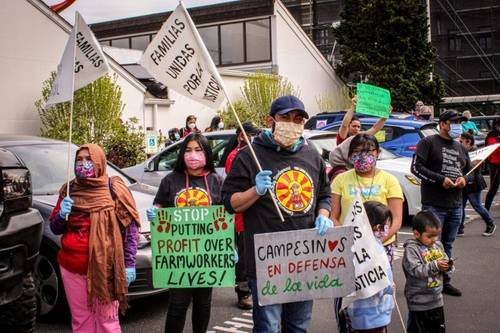

Yakima Herald Republic – Guest Editorial
Guest Opinion: Ninfa R. Gutierrez
The high rate of Covid-19 infections among the Latino population in Yakima County didn’t take me by surprise! Knowing well that poor dissemination of news in Spanish still exists, it was just a matter of time before we would see the adverse effects on our community.
KDNA 91.9 FM Public Radio is a Spanish language station where I’ve worked as a volunteer for 40 years. My work consists of producing community programs and sharing information of interest for the advancement of our farmworker community.
I have interviewed politicians and representatives of state agencies covering different issues on healthcare, employment, unemployment, education, housing, citizenship, etc.
In late January, those of us that are bilingual Spanish/English began hearing about the Coronavirus and how rapidly the virus was spreading. Since then, there has not been a single day that we don’t learn something new about COVID-19.
However, when compared to the rate of speed the English-speaking communities receive information, monolingual Spanish communities are still lagging in getting this vital information, which is creating a dangerous health gap.
Considering the danger of this pandemic, one would think that Washington State agencies would have acted swiftly to address health concerns in two of the state’s largest industries. It took three months for the Department of Health (DOH) and the Department of Labor & Industries (L& I) to finally produce guidelines for the agricultural and food processing industries.
Just this week, the state released (new) safety guidelines for agricultural employers. This comes after an epidemiologist for communicable diseases, Scott Lindquist, stated the agricultural and food production centers had significantly contributed to the outbreak.
In the last two months, we have seen workers walk out of their jobs from various fruit packing houses, revealing their work conditions. Some of the same group of strikers took a trip to Olympia to protest in front of L&I and the office of Governor Jay Inslee.
L&I has a long history with our community for being unresponsive to farmworker concerns. On a regular basis, we at Radio KDNA receive calls from our farmworker listeners, sharing about their hazardous work circumstances. We advise them to call L&I. However, more often than not, they are reluctant to contact L&I because of their prior experience with the agency.
As we have witnessed, COVID-19 doesn’t discriminate, although it disproportionately affects communities of color. It attacks regardless of the language you speak, the color of your skin, or social status.
We’re seeing family members infecting each other. I’m still saddened when I think about the Moran family of New York. At the hospital, the son said his last goodbyes to his loving father dying from COVID-19, only to be buried of the same disease the following week.
Our community of farmworkers have been invisible for a long time. Their concerns are not heard. Unlike other workers, they don’t have the benefit of being represented by a union. Their only recourse is to strike to have their voices be heard.
Yakima Valley is known throughout the world for its rich and abundant agriculture and you see this in magazines everywhere. What you rarely see are the people that harvest these crops. You don’t see the calloused hands and the sweat of the farmworkers, who are key to getting that food to your table. Without them you would have rotten apples hanging from the trees and grapes still on the vine, not in your wine glass.
Our community of farmworkers have been invisible for a long time. Their concerns are not heard. Unlike other workers, they don’t have the benefit of being represented by a union. Their only recourse is to strike to have their voices be heard.
As essential workers, they deserve to receive personal protective equipment, fair pay along with hazard pay, a provision for childcare, and healthcare, just like any other essential worker.
Posted June 21, 2020
We use cookies to improve your experience on our website. By browsing this website, you agree to our Privacy Policy.
x